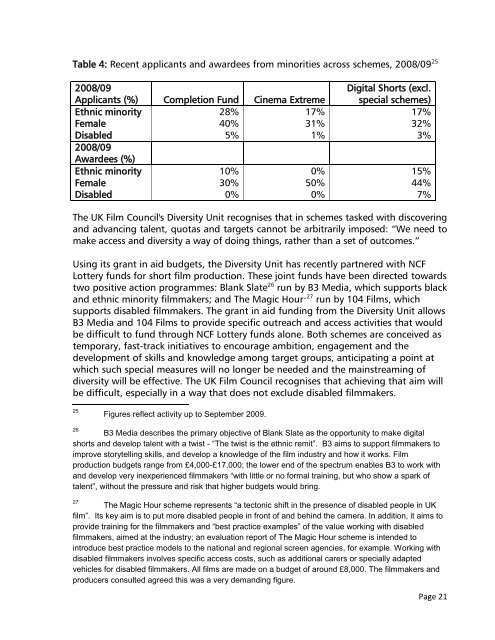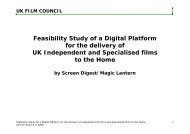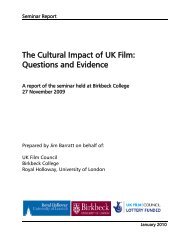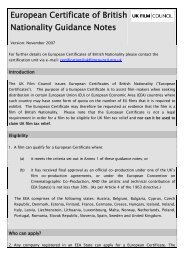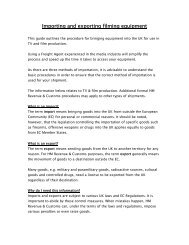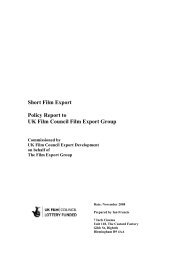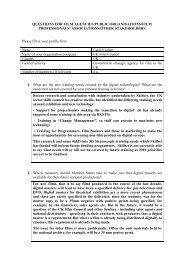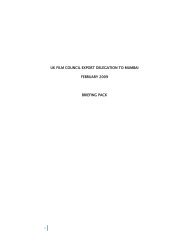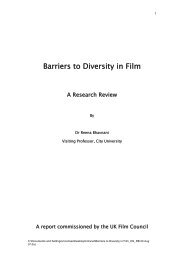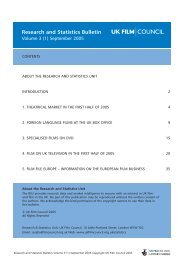Northern Alliance - BFI
Northern Alliance - BFI
Northern Alliance - BFI
Create successful ePaper yourself
Turn your PDF publications into a flip-book with our unique Google optimized e-Paper software.
Table 4: Recent applicants and awardees from minorities across schemes, 2008/09 25<br />
2008/09<br />
Digital Shorts (excl.<br />
Applicants (%) Completion Fund Cinema Extreme special schemes)<br />
Ethnic minority 28% 17% 17%<br />
Female 40% 31% 32%<br />
Disabled<br />
2008/09<br />
Awardees (%)<br />
5% 1% 3%<br />
Ethnic minority 10% 0% 15%<br />
Female 30% 50% 44%<br />
Disabled 0% 0% 7%<br />
The UK Film Council's Diversity Unit recognises that in schemes tasked with discovering<br />
and advancing talent, quotas and targets cannot be arbitrarily imposed: “We need to<br />
make access and diversity a way of doing things, rather than a set of outcomes.”<br />
Using its grant in aid budgets, the Diversity Unit has recently partnered with NCF<br />
Lottery funds for short film production. These joint funds have been directed towards<br />
two positive action programmes: Blank Slate 26 run by B3 Media, which supports black<br />
and ethnic minority filmmakers; and The Magic Hour ,,27 run by 104 Films, which<br />
supports disabled filmmakers. The grant in aid funding from the Diversity Unit allows<br />
B3 Media and 104 Films to provide specific outreach and access activities that would<br />
be difficult to fund through NCF Lottery funds alone. Both schemes are conceived as<br />
temporary, fast-track initiatives to encourage ambition, engagement and the<br />
development of skills and knowledge among target groups, anticipating a point at<br />
which such special measures will no longer be needed and the mainstreaming of<br />
diversity will be effective. The UK Film Council recognises that achieving that aim will<br />
be difficult, especially in a way that does not exclude disabled filmmakers.<br />
25 Figures reflect activity up to September 2009.<br />
26 B3 Media describes the primary objective of Blank Slate as the opportunity to make digital<br />
shorts and develop talent with a twist - “The twist is the ethnic remit”. B3 aims to support filmmakers to<br />
improve storytelling skills, and develop a knowledge of the film industry and how it works. Film<br />
production budgets range from £4,000-£17,000; the lower end of the spectrum enables B3 to work with<br />
and develop very inexperienced filmmakers “with little or no formal training, but who show a spark of<br />
talent”, without the pressure and risk that higher budgets would bring.<br />
27 The Magic Hour scheme represents “a tectonic shift in the presence of disabled people in UK<br />
film”. Its key aim is to put more disabled people in front of and behind the camera. In addition, it aims to<br />
provide training for the filmmakers and “best practice examples” of the value working with disabled<br />
filmmakers, aimed at the industry; an evaluation report of The Magic Hour scheme is intended to<br />
introduce best practice models to the national and regional screen agencies, for example. Working with<br />
disabled filmmakers involves specific access costs, such as additional carers or specially adapted<br />
vehicles for disabled filmmakers. All films are made on a budget of around £8,000. The filmmakers and<br />
producers consulted agreed this was a very demanding figure.<br />
Page 21


